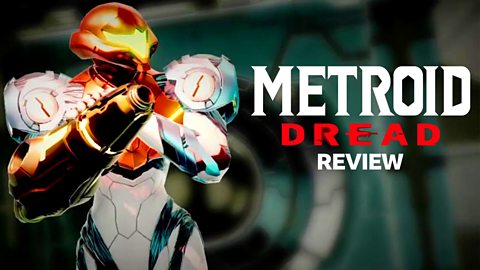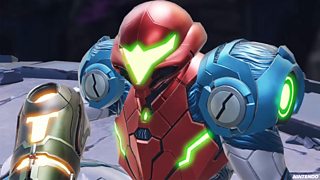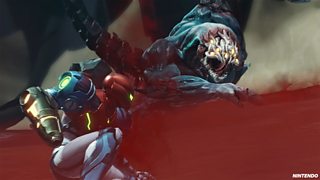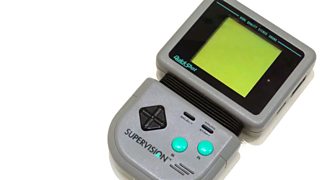Metroid Dread review: 'A return to form for the series that made me feel like a kid again'
By Ashley Dick // Βι¶ΉΤΌΕΔ The Social contributor // 11 October 2021
They say insanity is doing the same thing over and over again, but expecting different results. However, doing things over and over again, but slightly differently each time and expecting different results...that’s playing Metroid Dread.

Metroid Dread review
Practice makes perfect in Metroid Dread, where repetition and sequence will get you ahead.
Metroid blasted into the world in the 80s, combining the platforming of Super Mario Brothers with the exploration of The Legend of Zelda. Metroid brought a darker, sci-fi edge to the Nintendo platforms.
It was hugely popular critically and commercially and even spawned its own subgenre, Metroidvania. (That’s a portmanteau of Metroid and Castlevania - another hugely popular retro game.)
The big reveal of the original Metroid is that the protagonist, Samus, who dons a full coverage space suit for the whole game, is female!

The story goes that during development the Metroid team came up with an idea around ‘what if you got to the end of the game and discovered Samus is a woman?!’ Obviously the expectations of action-based media in the eighties were centred around male narratives, so to subvert this expectation was very forward thinking for the time. Because she is male coded until the reveal, Samus is not only one of the first female protagonists in gaming, she’s designed, programmed and treated just like any other male character.
Nintendo released many other Metroid titles over the past few decades, even branching to the first person shooter format. However, divergence from the charm of the original platform game wasn’t the best move. Later instalments faced criticism for the changes in characterisation, making Samus timid and emotional with a reduced emphasis in exploration. Metroid Dread, however, seems to be a return to form.
Bounty hunter Samus is deployed on a planet to investigate evidence of X, a species of parasite that can mimic any creature they infect. Samus must learn skills to tackle the various challengers - including simple creatures that hark back to the original game, complex robots, and gross monster bosses.
Samus is not only one of the first female protagonists in gaming, she’s designed, programmed and treated just like any other male character.
Not only does the game give you new skills as you progress, but you, the player, also have to do some learning.
The controls are very sensitive and take some getting used to. It responds so fast that it feels like the game was built for speedrunning, which calls back to the original game's varied endings for fast completion times - making it one of the first games to be popular with speedrunners. Once you get into the swing of the controls they do feel intuitive, and you do sink into a natural pace. It just takes some erratic exploration to get you off the ground. It's especially tricky as weapons can be used in different ways by pressing different buttons, and to defeat an enemy you have to use it one way, then switch to using it another way.
You’re rewarded for exploring and experimenting, so there are many pleasant surprises. You'll find new ways to gain energy and ammo and feel a sense of achievement in problem solving. The nature of a non-linear platformer means returning to spaces you’ve been before but perhaps with a new power, new knowledge or having flipped a switch that changes how you interact.
If you like problem solving and learning you’ll really enjoy the game. It uses a lot of sequencing, so if you can figure out the pathway of a baddy or the pattern that a boss strikes in, you’ll have a greater chance of progressing.

This made me feel like a kid again, when I’d spend hours with my friends trying to beat one boss. But it also made me feel a bit exhausted. The game doesn’t have different difficulty settings which means if you’re stuck, you’re stuck.
It’s an issue in terms of accessibility because if you’re not the type to pick up on sequences, then you’ll miss out on how to progress. I am not the only person I know who spent a good few hours on one particular boss fight which just takes intense repetition to learn what it is you need to do to get through. Spending all that time looking for the sequence and trying different attacks, which sometimes I messed up because of the sensitivity of the controls, got a bit tedious.
Years ago, In Charlie Brooker’s Gameswipe, Dara O'Briain talked about how gaming is the only medium that doesn’t allow you to continue if you are stuck. He talked about how you’d never read a book that, part way through, asks you to prove you understand the themes and character motivations, otherwise you can’t read the next chapter. And that interview came to mind when I was fighting this boss.
I know you usually need to learn how to defeat the bad guy to defeat the bad guy. But with Metroid Dread, you need to learn a long sequence of events and execute them time and time again in order to inch closer and closer to defeating the bad guy.
This made me feel like a kid again, when I’d spend hours with my friends trying to beat one boss.
That’ll be fun for some people, and that will be the end of playing the game for others. There’s an irony that Metroids, the in-game namesake, are a parasite which latch onto creatures and drain their life. Sometimes I felt life draining from me when I was fighting the bosses. Life imitates art.
I really like the aesthetic of the game. It has a comic book look during cutscenes and the colour scheme has a muted quality that makes the contrasting intensity of sci-fi much easier on the eye. The characters all really fit the world, and even look quite charming. I personally would like to be reincarnated as one of the flying dolphin things - they’re majestic. The more intense and sinister bad guys range from the friendly robot gone bad, to complete abomination of scary parts, driving home the dread.
Whether cracking the gameplay sequences gives you a sense of pride or a sense of crushing exhaustion, might depend on how much you enjoy repetition. I certainly felt great whenever I made a discovery. Overall, the exploration and experimentation will feel rewarding to natural problem solvers.




